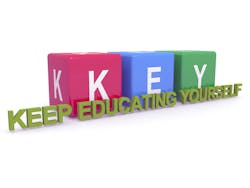Three Ways to Continue Expanding Your HVACR Knowledge
This column courtesy of Fieldpiece
Every day, it seems HVACR systems are evolving to work with new refrigerants, use less energy, and take advantage of new innovations. Since many customers want to use the best technology to heat and cool their homes and offices, staying up to date on these changes is crucial.
Market shifts also change the way that diagnostic tools are utilized. Staying up-to-date on both the latest HVACR systems as well as the tools used to diagnose and repair them has never been more important. Here are three ways that HVACR professionals can expand their knowledge and stay ahead of the curve.
1. Stay Sharp
Continuing education can help a tech stay in the know and prepared for industry changes. Leveraging online tutorials, podcasts, videos, HVACR training meetings and conferences can help techs to learn the latest trends, stay current on emerging technologies, and utilize existing tools in the best ways possible. One such place is Fieldpiece University: https://www.fieldpiece.com/fieldpiece-university/. This online resource was created to help HVACR technicians boost their skills and learn more about Fieldpiece products. These courses explore how each product benefits customers and offer Pro Tips for using them correctly in the field. This is an ideal tool for any HVACR professional looking to get the most from the tools they work with every day to get better, faster, and easier.
2. Help others
Learning on the job is another way to grow. Try volunteering with local charities or churches for pro bono work and for neighbors in need. Helping a family maintain an older furnace through the winter is a great way to gain experience on a legacy system. In an ever-changing landscape of HVACR technology, familiarity with a range of systems both old and new is yet another important tool in a tech’s bag. And helping your friends and neighbors adds an extra sense of accomplishment after a long day in the field. (CB ed. note: if you need to use your employer's tools or vehicle, obtain employer's permission first)
3. Leverage your senses
Before a tech opens their tool bag and starts running diagnostic tests, it’s important to know what needs fixing. Start by asking questions and really listening. Then use your eyes and touch to verify and pinpoint potential sources of those answers. The customer doesn’t need to be an expert in HVACR to answer. Questions about symptoms they can see and feel in their spaces may lead to finding the problem. Letting the customer speak typically points in the direction of the real reason for the call. The more useful information that’s gathered up front, the easier it can be to find the true cause of the issue. This may lead to a standard service, maintenance or even a system upgrade. Leveraging your ears, eyes, and touch will identify a whole host of potential issues and solutions and help ensure the right solution is put into place.
If you’re looking to be a better HVACR tech tomorrow, start learning, helping and listening TODAY.
